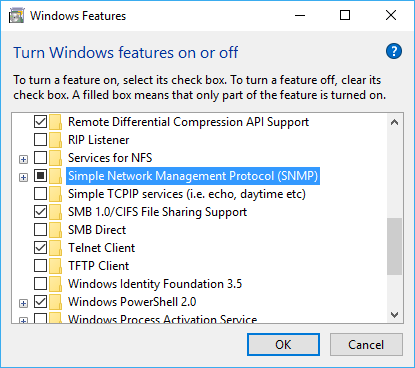Windows 2012 R2 Snmp Version
According to Technet's Features Removed or Deprecated in Windows Server 2012, SNMP is being depreciated. SNMP is deprecated. Instead, use the Common Information Model (CIM), which is supported by the WS-Management web services protocol and implemented as Windows.
- Windows 2012 R2 Snmp Version Free
- Windows Server 2012 R2
- Windows Server 2012 Versions
- Windows 2012 R2 Snmp Version
- Windows 2012 R2 Snmp Version Download
This article provides a workaround for an issue where event ID 1500 is logged when Simple Management Network Protocol (SNMP) is enabled.

Original product version: Windows Server 2019, Windows Server 2016, Windows Server 2012 R2
Original KB number: 2002303
Symptoms
After the SNMP Feature is installed in Windows Server, the following event ID 1500 source SNMP is logged in the System Event Log and one further event is logged for every start of the SNMP Service.
Log Name: System
Source: SNMP
Date: <Date> <Time>
Event ID: 1500
Task Category: None
Level: Error
Keywords: Classic
User: N/A
Computer: <Computer Name>
Description:
The description for Event ID 1500 from source SNMP cannot be found. Either the component that raises this event is not installed on your local computer or the installation is corrupted. You can install or repair the component on the local computer. If the event originated on another computer, the display information had to be saved with the event. The following information was included with the event: SYSTEMCurrentControlSetServicesSNMPParametersTrapConfiguration.
Note
Once SNMP Traps are configured, the event is not logged anymore.
Cause
This error is logged because the SNMP Service checks if the registry path mentioned in the Event Description is present and determines that it is not.
This registry path is needed for the SNMP trap configuration and is created once traps are set up.
Workaround
This has been determined not to have any influence to the operation of SNMP or the system and should be ignored.
While the event will be logged after the SNMP Feature is initially installed and started, further reoccurrences of the Event can be avoided by creating the registry path in question listed below.
To work around this issue by the following operation:
- Click Start, point to Control Panel, point to Administrative Tools, and then click Computer Management.
- In the console tree, expand Services and Applications, and then click Services.
- In the right pane, double-click SNMP Service.
- Click the Traps tab.
- Click OK.
You will notice, TrapConfiguration key is created under HKEY_LOCAL_MACHINESYSTEMCCSServicesSNMP by that operation.
More information
The SNMP Service encountered an error while accessing the registry key HKEY_LOCAL_MACHINESYSTEMCurrentControlSetServicesSNMPParametersTrapConfiguration.
 I have a Windows 2012 R2 Essentials server that I am monitoring with Nagios. I notice high SNMP service utilization to the point I start running low on memory. Over time the amount of memory this 32-bit service uses keeps increasing until Nagios complains and I have to restart the system. I'm doing a decent amount of SNMP calls for various things, using check_intel_raid, a perl script.
I have a Windows 2012 R2 Essentials server that I am monitoring with Nagios. I notice high SNMP service utilization to the point I start running low on memory. Over time the amount of memory this 32-bit service uses keeps increasing until Nagios complains and I have to restart the system. I'm doing a decent amount of SNMP calls for various things, using check_intel_raid, a perl script. With the perl script I check:
[*] Virtual Disk state
[*] External enclosure Power Supply
[*] External enclosure fan status
[*] External enclosure temp status
[*] External enclosure any alarms
Windows 2012 R2 Snmp Version Free
I also have Dell Command Monitor 9.1 installed on this server and monitoring thru SNMP:
[*] Chassis status
[*] Chassis Intrusion Status
[*] Cooling device status
[*] Overall System State
[*] Voltage Status
 [*] Memory Status
[*] Memory Status[*] Processor Status.
Also have an SNMP_TRAP service setup but don't know if it does anything ever. See log entries about trapping ping failures which is odd as SNMP couldn't send those messages if the system is down.
Anywho, any idea what's causing the memory, I'll call it leaks, in my system? My guess is dell command monitor but don't want to be presumptuous until I can find some way to know what's causing this.
Windows Server 2012 R2
Thanks.JR
Windows Server 2012 Versions
EDIT: Note I have a 64-bit SNMP Service running using minimal memory and a 32-bit SNMP Service using loads of memory. The 64-bit one has an expandable branch showing it's running the SNMP Service, the 32-bit one doesn't expand but does point to a snmp.exe file in the C:WindowsSysWOW64 folder and also calls itself the 'SNMP Service'